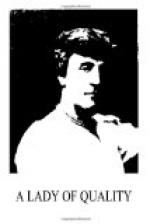Each child born they clasped and kissed so, and were so clasped and kissed by; each one calling the tender unwed woman “Mother Anne,” and having a special lovingness for her, she being the creature each one seemed to hover about with innocent protection and companionship.
The wonder of Anne’s life grew deeper to her hour by hour, and where she had before loved, she learned to worship, for ’twas indeed worship that her soul was filled with. She could not look back and believe that she had not dreamed a dream of all the fears gone by and that they held. This—this was true—the beauty of these days, the love of them, the generous deeds, the sweet courtesies, and gentle words spoken. This beauteous woman dwelling in her husband’s heart, giving him all joy of life and love, ruling queenly and gracious in his house, bearing him noble children, and tending them with the very genius of tenderness and wisdom.
But in Mistress Anne herself life had never been strong; she was of the fibre of her mother, who had died in youth, crushed by its cruel weight, and to her, living had been so great and terrible a thing. There had not been given to her the will to battle with the Fate that fell to her, the brain to reason and disentangle problems, or the power to set them aside. So while her Grace of Osmonde seemed but to gain greater state and beauty in her ripening, her sister’s frail body grew more frail, and seemed to shrink and age. Yet her face put on a strange worn sweetness, and her soft, dull eyes had a look almost like a saint’s who looks at heaven. She prayed much, and did many charitable works both in town and country. She read her books of devotion, and went much to church, sitting with a reverend face through many a dull and lengthy sermon she would have felt it sacrilegious to think of with aught but pious admiration. In the middle of the night it was her custom to rise and offer up prayers through the dark hours. She was an humble soul who greatly feared and trembled before her God.
“I waken in the night sometimes,” the fair, tall child Daphne said once to her mother, “and Mother Anne is there—she kneels and prays beside my bed. She kneels and prays so by each one of us many a night.”
“’Tis because she is so pious a woman and so loves us,” said young John, in his stately, generous way. The house of Osmonde had never had so fine and handsome a creature for its heir. He o’ertopped every boy of his age in height, and the bearing of his lovely youthful body was masculine grace itself.
The town and the Court knew these children, and talked of their beauty and growth as they had talked of their mother’s.
“To be the mate of such a woman, the father of such heirs, is a fate a man might pray God for,” ’twas said. “Love has not grown stale with them. Their children are the very blossoms of it. Her eyes are deeper pools of love each year.”
CHAPTER XXIII—“In One who will do justice, and demands that it shall be done to each thing He has made, by each who bears His image”




